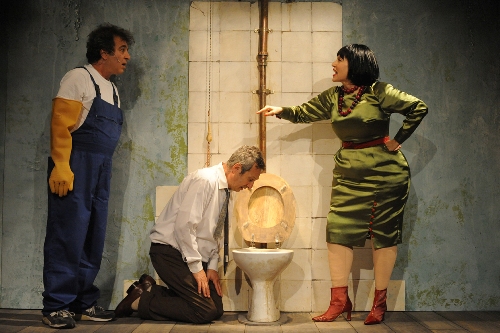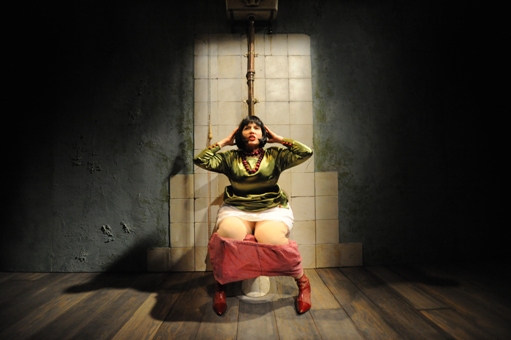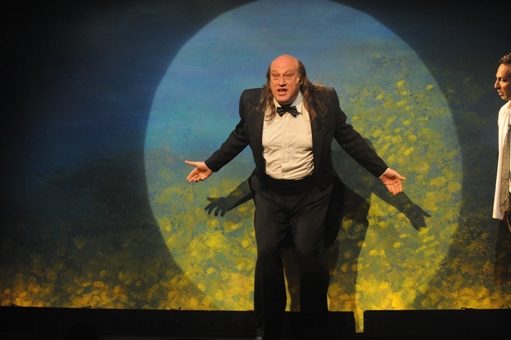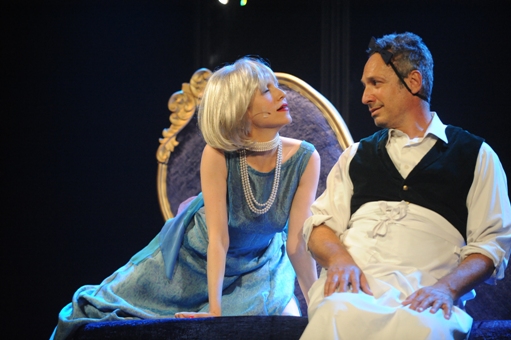
Merde! Hanoch Levin’s Ikhsh Fisher is funny, crude, poetic and achingly intelligent. Directed by Roni Pinkovitch, with music by Yossi Ben Nun, the play is currently running in Cameri 3 – the theatre originally designed for Hamlet, with two facing rows of swiveling chairs, and several stage areas surrounding and between the seating areas – a perfect venue for this hilarious romp with a touch of the cabaret.
Shmuel Vilozny is tenderly funny as Ikhsh – in inimitable Levin style the name itself is a playground for the imagination, with associations from everyman (Ish means man in Hebrew) to “I” (ikh – German and Yiddish singular nominative personal pronoun) and of course – “ikhs” (similar to ick in English), a colloquial term used to designate disgust. Ikhsh is first glimpsed from behind, facing the green, mildewed wall of a dingy public toilet, taking an interminable piss. He moves through the familiar motions – looking up, hoping for a gushing stream, listening to the disappointing trickle, looking down, perhaps giving it a wiggle of encouragement, when suddenly, he realizes that his ding dong is gone.
Is Levin taking a piss on the audience? Of course, that is part of his appeal.
Ikhsh, perhaps like every man, had already experienced some anxiety about this possibility, even singing a little song to his dear dong, but he never really thought that something like this could happen. After a frantic search in his pants confirms that his member is missing, he sees that while trying to tinkle, his tool tumbled into the toilet. Confronted with the reality of the loss, he comments incredulously, “At the end of the day, it may even turn out that we really do die after all.”*
Armed only with optimism and a very limited intelligence, Ikhsh philosophizes on the ramifications of this event, considering the effect on his sense of identity. The Hebrew term in this case is quite suggestive: HaKatan – literally “the small one,” a miniature of the self. In the hope of retrieving his pocket rocket, he calls an ambulance.

Enter the multi-faceted Keren Mor as Parnabactche, a woman of grand proportions, ready to dump her man for a hot, Mexican lover (suavely played by Eran Sarel) Chombatuches (Chom means fever in Hebrew, and do I really need to translate “tuches”?). Parnabactche makes full use of the space that Ikhsh has recently vacated to void herself of all the useless shit in her life, talking non-stop in a somewhat self-congratulatory, grating voice – Mor at her comic best.

While I am often angered by the apparent hatred and contempt for women that Levin expresses in his writing, it is perhaps comforting to note that he doesn’t have much admiration for men either, conferring his condemnation equally on all. Levin’s characters are self-absorbed to the point of obsession, narcissistic and pathetic, yet somehow quite likeable, as exemplified by Moti Katz as Hadov-Moshe the ever-so-Israeli paramedic.
Between the battle of the sexes with Parnabactche and the battle with bureaucracy, Icsch’s poor pecker is sent down the sewage pipes and the stage is set for a great game of “where’s my willie?” as Ikhsh wanders the wide world in search of his winkie.

Although far more crude and perhaps more lustily humorous than his bleak brother, Levin’s work may well be compared to that of his fellow poetic minimalist Samuel Beckett. As the catastrophe sends Ikhsh to search the world over for his wee wee, Levin’s outrageous situations, bizarre characters and scatological humor provoke far more than laughter. Like Yeats’ Crazy Jane (“love has pitched his mansion in the place of excrement”) and Beckett’s “la merde universelle” (in The End – it appears in the English translation as “the universal muck”) the provocative (verging on offensive) language and colorful imagery is an invitation to take a good hard look at our own reflection.






Dear Daniel – Hanoch Levin has an extensive and varied repertoire – some of it very lyrical and poetic, such as, perhaps his finest work “Requiem,” some of it very satiric and political, and some of it dealing with human relationships scrutinizing even the least noble moments and sentiments, with explicit language and scatalogical humor. Icsh Fisher is a minor work, perhaps not the best choice for a first exposure to Hanoch Levin. I know that “Krum” has often been produced in Poland, if you have the opportunity to see it, I would give Hanoch Levin another chance.
I was so excited to go the IMCA theater in Warsaw, Poland to see a play “Icsch Fisher” of Izraeli playwright Hanoch Levin. I left the theater disgusted 45 minutes after the start. I couldn’t stand actors talking about pissing and shitting. How the writer of the above review could call it funny and intelligent? I love the Jewish humor but there was none there. I am a theater producer and I could never produce this play in my theater. I asked myself “What was it?”.
Comments are closed.